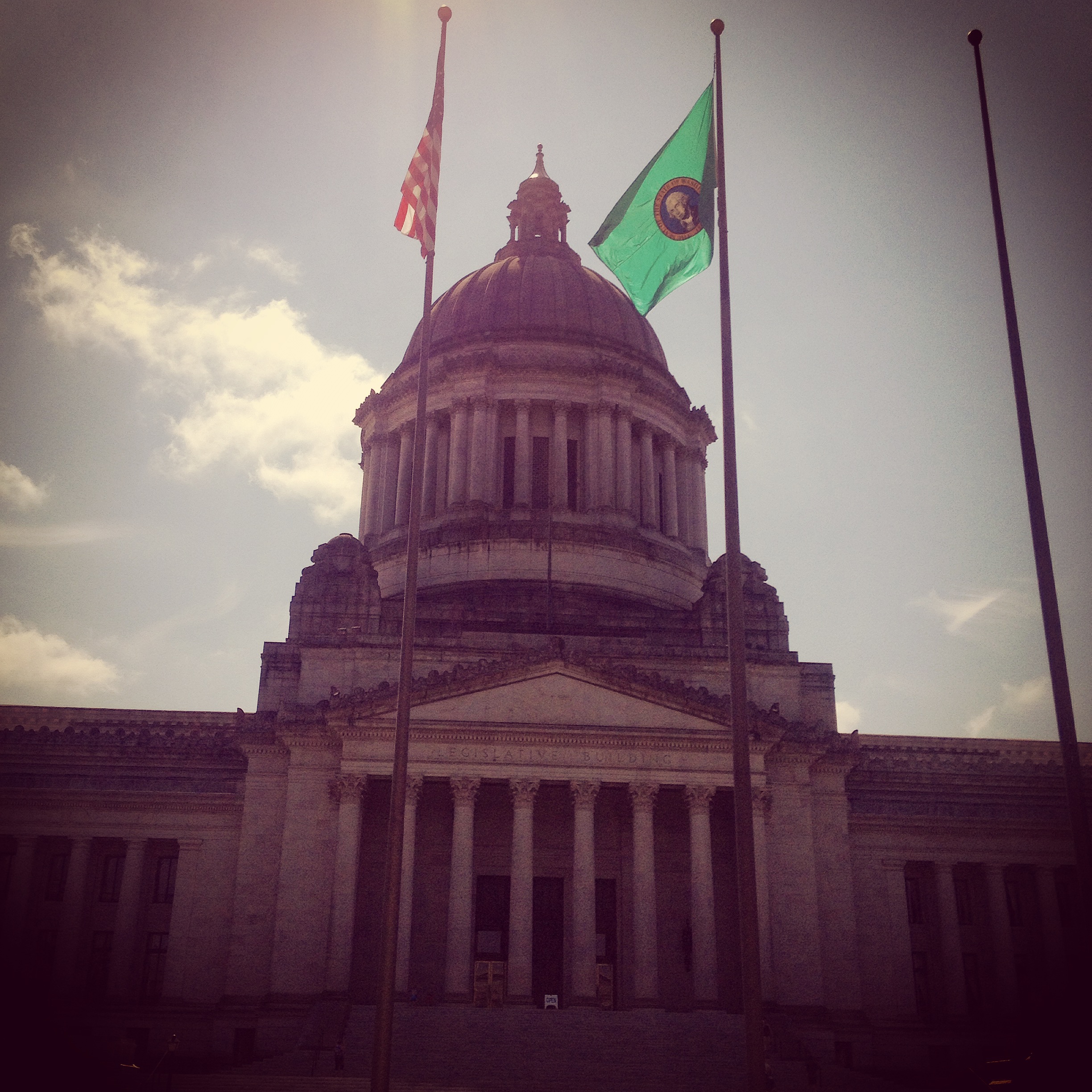In response to the apparent passage of Initiative 976, Washington State’s political leaders have begun acting as if they are required to slash public spending, especially on transportation projects–even though the initiative requires no such thing. For example, Governor Jay Inslee announced a freeze on all Washington State Department of Transportation projects not yet under way.
The Chair of the Senate Transportation Committee, Democrat Steve Hobbs of Snohomish County, predicted doom on Wednesday telling Crosscut’s Melissa Santos “Basically, I kind of view this as a sinking ship, and I have to do what I can to try to save most of the people on the ship—but the ship’s going down…This definitely will set us back 10 years, I think, with transportation.”
Democratic State Senator Marko Liias of Snohomish County put it bluntly when he tweeted “If voters ask us to reduce spending & it’s found to be constitutional, we should respect it & cut projects that don’t pass a climate lens.”
In the middle of a climate crisis, these attitudes are irresponsible. Seattle is experiencing some of the fastest growth of transit ridership of any city in the country while also seeing rates of car ownership decline. Our state’s leaders should be working to protect and accelerate those trends, rather than stop them yet again.
The truth is that voters didn’t ask for transportation projects to be slashed. The passage of I-976 is yet another lashing out by voters angry at a regressive tax system. Eyman is a typical car activist who thinks driving should be effectively subsidized by government and has a decades-long hostility to mass transit, and who leverages voter anger at a broken tax code for his own anti-transit ideology. There’s no reason at all why the governor and legislators should give into those desires. No transit agency, city government, or state office should have to suffer any service cut at all. Olympia can simply backfill the funds lost with the cut to the motor vehicle excise tax (MVET) with new, progressive revenue.
But they don’t. Instead, political leaders immediately assume they have to cut spending. And this forces us to confront the dirty little secret of the state legislature: they’ve been enabling Tim Eyman all along.
For those new to Washington State, it may be either surprising or depressing to learn that all of this has happened before. Twenty years ago, Tim Eyman made his name with Initiative 695, which slashed car tabs down to $30. Despite warnings by advocates and politicians that passage would devastate transportation spending, I-695 was approved by a 56-44 margin, roughly the same margin by which I-976 is passing.
In early 2000, a King County Superior Court judge overturned I-695 for violating the single-subject rule governing ballot initiatives, and the Washington State Supreme Court upheld the ruling. Unfortunately, that wasn’t the end of the story. Later that year, the state legislature—with a 49-49 Democratic-Republican tie in the House, a Democratic State Senate majority, and a Democratic governor—actually voted I-695 into law themselves, gutting transportation funding and transit services across the state.
Shockingly, this wouldn’t be the first time the legislature did Eyman’s work for him. In 2001, Eyman returned with Initiative 747, which imposed a 1% annual limit on property tax growth. It passed with 58% of the vote. Again, the courts overturned it. And again, a Democratic legislature—this time one with a two-thirds supermajority—enacted it into law in 2007. The results have been devastating for local governments, especially schools.
The legislature’s enabling of Eyman goes beyond their appalling willingness to save his ballot initiatives from the courts. Eyman typically puts his initiatives on a statewide ballot in odd numbered years, knowing that these elections see smaller and more conservative voter turnout. Unlike California and Oregon, however, Washington’s legislature continues to allow statewide ballot initiatives to be voted on in odd numbered years, greasing the skids for Eyman’s proposals to be approved by a narrow slice of the electorate.

More importantly, the legislature has failed to fix the underlying problem of a regressive tax code that largely shields large corporations and wealthy individuals from taxation and instead balancing the budget on the backs of everybody else.
In the aftermath of I-695’s passage, there was a brief moment of recognition by the legislature that the state’s broken tax system needed fixing. The 2001 legislature convened a blue ribbon commission, chaired by Bill Gates, Sr., to study the problem and make recommendations. You can still read their report online, and one of its central recommendations was an income tax. The legislature accepted the report, put it on a shelf, and moved on to other business.
Despite knowing for the last 20 years that the state’s tax system is broken and unable to fund the necessities of a 21st century civilization, especially in the midst of a climate crisis, the legislature has done nothing about it. That 20-year span matches up with the tenure of Frank Chopp as Speaker of the House—which is no accident.

Chopp was co-Speaker of the House in 2000 when legislators decided to enact I-695 themselves. He was sole Speaker then the legislature shelved the Gates commission’s tax proposals. He was Speaker in charge of a commanding 2/3 majority, on the eve of a presidential election everyone knew would be a Democratic wave, when he and Governor Christine Gregoire saved Eyman’s 1% property tax limit from the courts by writing it into state law themselves. Chopp even blocked a bill in the 2019 legislative session that would have finally removed the obnoxious advisory votes—another Eyman innovation—from voters’ ballots.
Chopp’s theory has always been that Eyman was to be appeased, not defeated, no matter the cost to public services and communities across the state. He would tell Democratic legislators that failing to enact Eyman’s proposals would cost them seats at the election, despite there being no evidence for this. Elections in Washington State follow national trends relatively closely. Democrats have only lost seats in the State House in the 2010 and 2014 elections, which were notably bad elections for Democrats across the country.
There is also no evidence at all to suggest voters make their legislative choices based on car tabs. There were widespread concerns that the big increase in MVET approved by voters in 2016 for the ST3 projects would prevent Democrats from flipping red seats in 2017 and 2018, and yet those suburban seats all went to the Democrats anyway.
With Chopp retiring as speaker this year, there is finally an opportunity to move beyond the belief that we have to give Eyman what he wants in order to govern the state. Unfortunately, as shown by the statements from Governor Inslee and Democratic State Senators Liias and Hobbs, the belief that Eyman must be appeased and public spending slashed remains dominant in Olympia.
As we confront the climate crisis, as well as the basic need for mass transit and safer streets for people who walk, bike, and roll, it is clear that cutting transportation funding is simply not a serious option. Neither should be raiding other public services, such as education and health care, to backfill the funding lost by the passage of I-976.
Instead, it is time for the state to finally begin fixing its broken tax code and pass new progressive revenue. A capital gains tax is an obvious starting point. So too is an income tax, or a carbon tax, or other sensible progressive revenue sources. Legislators could even do the bare minimum of providing two years of funding to backfill I-976 until 2022, when they would be able to overturn I-976 with a simple majority vote.
Given that I-976 is failing in Seattle and King County, it would be totally unacceptable for legislators—especially those representing those districts—to allow service cuts to take place in those jurisdictions.
If our state’s political leaders want us to believe they take the climate crisis seriously, then they need to show that they are leaders. Stop reacting to the passage of an Eyman initiative by giving him everything he wants. Transportation funding should be protected, not a dime should be cut, not a single bus route slashed or eliminated, not a single project delayed or canceled. Use the passage of I-976 to fix our broken tax code and protect and expand transit service.

Robert Cruickshank
Robert is the Director of Digital Strategy at California YIMBY and Chair of Sierra Club Seattle. A long time communications and political strategist, he was Senior Communications Advisor to Seattle Mayor Mike McGinn from 2011-2013.

